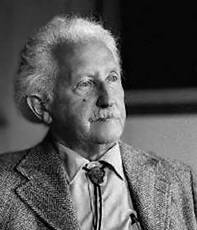Lesson 11: Erikson: Developing Trust, Autonomy, and Initiative
Attention

In this lesson one of the basic developmental tasks of trust will be discussed. We are not talking about the kind of broken trust that comes from bad adult relationships or disappointment, but the root-level trust and sense that you belong in the world, that you can act autonomously, and that you initiatives are valuable and welcomed.
When these stages are not negotiated positively, the results can last a lifetime.
Learning Outcomes
Upon completion of this lesson's material, students will be able to:
- Describe the formative nature of the first three stages in Erikson's theory
Teaching
Erikson's First Three Stages
Erik Erikson, a student of Freud, developed what is likely the most well known lifespan theory of development. He coined the term Psychosocial to describe his theory in order to highlight its emphasis on the interaction between the Psyche and the Social environment in which the child is growing up. This interaction is the source of the energy that pushes development forward.

At this point in the course we are going to start with a discussion of the first three stages. You will then need to explore the memories and thoughts regarding this part of life with the person you are interviewing.
Basic Trust versus Mistrust
Erikson felt that the first interaction with the world experienced by the child is one where they are removed from the comfort of the womb and thrust into a world that is cold, bright, and does not always meet their needs immediately. The caregivers respond to the needs of the child as best they can and the child develops a sense of how trustworthy the world is. "With a proper balance of trust and mistrust, infants can acquire HOPE, which is an openness to new experience tempered by wariness that discomfort or danger may arise".
Autonomy versus Shame and Doubt
During the first few years of life children begin to realize that they can control their own actions. Children will strive for autonomy and independence from others. Their own doubt as to how they can handle independence and the shame of failure counteract this effort. "A blend of autonomy, shame, and doubt gives rise to WILL, the knowledge that, within limits, youngsters can act on their world intentionally."
Initiative versus Guilt
At this point in life (roughly ages 3-4) children begin to take on specific responsibilities for themselves. Play is more purposeful and children begin to explore adult roles. These ambitions however, are sometimes in conflict with their environment ("helping too much"). "PURPOSE is achieved with a balance between individual initiative and a willingness to cooperate with others."
Applying Erikson to your Interview Subject Much of what has happened to you or your subject in regard to these first three stages are outside of memory (although some may have some very clear associations...particularly of efforts to be independent and to take initiative in the household---stages 2 and 3). However, the "successful" navigation of these stages in particular play out across the lifespan in other areas of life. Consider asking your subject to discuss the early emotional relationship they had with their parents but examine also the types of emotional relationships your subject had with their own kids and with their spouse. These will give you good indications as to how they did with the Trust vs. Mistrust stage. Consider asking your subject about efforts in independence that they felt were important. Instances of being assigned responsibilities in the household, etc. How independent have they been through their lives? What initiatives and self-direction have the expressed throughout their lives? These stories will help you analyze how well they did with the next two stages. |
Click HERE for a really cool summary of Erikson's stages and how, in particular, they relate to relationships. We will be exploring the rest of Erikson's stages later!
Assessment
Lesson 11 Discussion
Interview your subject regarding their experiences in Erikson's first three stages (review the "Applying Erikson to your Interview Subject" section in the Lesson Plan. In the discussion relate a story from your subject's life that exemplifies a transition through one or more of these stages. Compare their transition experiences to your own.
How well did you either of you do in successfully navigating these stages?